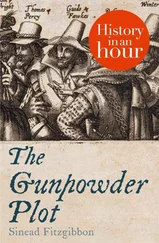John Gerard - What was the Gunpowder Plot? The Traditional Story Tested by Original Evidence
Здесь есть возможность читать онлайн «John Gerard - What was the Gunpowder Plot? The Traditional Story Tested by Original Evidence» — ознакомительный отрывок электронной книги совершенно бесплатно, а после прочтения отрывка купить полную версию. В некоторых случаях можно слушать аудио, скачать через торрент в формате fb2 и присутствует краткое содержание. Жанр: foreign_antique, foreign_prose, на английском языке. Описание произведения, (предисловие) а так же отзывы посетителей доступны на портале библиотеки ЛибКат.
- Название:What was the Gunpowder Plot? The Traditional Story Tested by Original Evidence
- Автор:
- Жанр:
- Год:неизвестен
- ISBN:нет данных
- Рейтинг книги:5 / 5. Голосов: 1
-
Избранное:Добавить в избранное
- Отзывы:
-
Ваша оценка:
- 100
- 1
- 2
- 3
- 4
- 5
What was the Gunpowder Plot? The Traditional Story Tested by Original Evidence: краткое содержание, описание и аннотация
Предлагаем к чтению аннотацию, описание, краткое содержание или предисловие (зависит от того, что написал сам автор книги «What was the Gunpowder Plot? The Traditional Story Tested by Original Evidence»). Если вы не нашли необходимую информацию о книге — напишите в комментариях, мы постараемся отыскать её.
What was the Gunpowder Plot? The Traditional Story Tested by Original Evidence — читать онлайн ознакомительный отрывок
Ниже представлен текст книги, разбитый по страницам. Система сохранения места последней прочитанной страницы, позволяет с удобством читать онлайн бесплатно книгу «What was the Gunpowder Plot? The Traditional Story Tested by Original Evidence», без необходимости каждый раз заново искать на чём Вы остановились. Поставьте закладку, и сможете в любой момент перейти на страницу, на которой закончили чтение.
Интервал:
Закладка:
On the other hand, when we examine into the details supplied to us as to the progress of the affair, we find that much of what the conspirators are said to have done is well-nigh incredible, while it is utterly impossible that if they really acted in the manner described, the public authorities should not have had full knowledge of their proceedings. We also find not only that the same authorities, while feigning ignorance of anything of the kind, were perfectly well aware that these very conspirators had something in hand, but that long before the "discovery," in fact, at the very time when the conspiracy is said to have been hatched, their officials were working a Catholic plot, by means of secret agents, and even making arrangements as to who were to be implicated therein.
These are, in brief, some of the considerations which point to a conclusion utterly at variance with the received version of the story, the conclusion, namely, that, for purposes of State, the government of the day either found means to instigate the conspirators to undertake their enterprise, or, at least, being, from an early stage of the undertaking, fully aware of what was going on, sedulously nursed the insane scheme till the time came to make capital out of it. That the conspirators, or the greater number of them, really meant to strike a great blow is not to be denied, though it may be less easy to assure ourselves as to its precise character; and their guilt will not be palliated should it appear that, in projecting an atrocious crime, they were unwittingly playing the game of plotters more astute than themselves. At the same time, while fully endorsing the sentiment of a Catholic writer, 30 30 A plain and rational account of the Catholick Faith , etc. Rouen, 1721, p. 200.
that they who suffer themselves to be drawn into a plot like fools, deserve to be hanged for it like knaves, it is impossible not to agree with another when he writes: 31 31 Dodd, Church History of England , Brussels, 1739, i. 334.
"This account does not excuse the conspirators, but lays a heavy weight upon the devils who tempted them beyond their strength."
The view thus set forth will perhaps be considered unworthy of serious discussion, and it must be fully admitted, that there can be no excuse for making charges such as it involves, unless solid grounds can be alleged for so doing. That any such grounds are to be found historians of good repute utterly deny. Mr. Hallam roundly declares: 32 32 Constitutional History , i. 406, note, Seventh Edition. In the same note the historian, discussing the case of Father Garnet, speaks of "the damning circumstance that he was taken at Hendlip in concealment along with the other conspirators." He who wrote thus can have had but a slight acquaintance with the details of the history. None of the conspirators, except Robert Winter, who was captured at Hagley Hall, were taken in concealment, and none at Hendlip, where there is no reason to suppose they ever were. Father Garnet was discovered there, nearly three months later, in company with another Jesuit, Father Oldcorne, on the very day when the conspirators were executed in London, and it was never alleged that he had ever, upon any occasion, been seen in company with "the other conspirators."
"To deny that there was such a plot, or, which is the same thing, to throw the whole on the contrivance and management of Cecil, as has sometimes been done, argues great effrontery in those who lead, and great stupidity in those who follow." Similarly, Mr. Gardiner, 33 33 History , i. 255, note.
while allowing that contemporaries accused Cecil of inventing the Plot, is content to dismiss such a charge as "absurd."
Whether it be so or not we have now to inquire.
CHAPTER II.
THE PERSONS CONCERNED
At the period with which we have to deal the chief minister of James I. was Robert Cecil, Earl of Salisbury, 34 34 When James came to the throne Cecil was but a knight. He was created Baron Cecil of Essendon, May 13th, 1603; Viscount Cranborne, August 20th, 1604; Earl of Salisbury, May 4th, 1605.
the political heir of his father, William Cecil, Lord Burghley, 35 35 Robert, as the second son, did not succeed to his father's title, which devolved upon Thomas, the eldest, who was created Earl of Exeter on the same day on which Robert became Earl of Salisbury.
and of Walsingham, his predecessor in the office of secretary. It is clear that he had inherited from them ideas of statesmanship of the order then in vogue, and from nature, the kind of ability required to put these successfully in practice. Sir Robert Naunton thus describes him: 36 36 Fragmenta Regalia , 37. Ed. 1642.
"This great minister of state, and the staff of the Queen's declining age, though his little crooked person 37 37 He was but little above five feet in height, and, in the phrase of the time, a "Crouchback." King James, who was not a man of much delicacy in such matters, was fond of giving him nicknames in consequence. Cecil wrote to Sir Thomas Lake, October 24th, 1605: "I see nothing yt I can doe, can procure me so much favor, as to be sure one whole day what title I shall have another. For from Essenden to Cranborne, from Cranborne to Salisbury, from Salisbury to Beagle, from Beagle to Thom Derry, from Thom Derry to Parret which I hate most, I have been so walked, as I think by yt I come to Theobalds, I shall be called Tare or Sophie." (R.O. Dom. James I. xv. 105.)
could not provide any great supportation, yet it carried thereon a head and a headpiece of vast content, and therein, it seems, nature was so diligent to complete one, and the best, part about him, as that to the perfection of his memory and intellectuals, she took care also of his senses, and to put him in Lynceos oculos , or to pleasure him the more, borrowed of Argus, so to give him a perfective sight. And for the rest of his sensitive virtues, his predecessor had left him a receipt, to smell out what was done in the Conclave; and his good old father was so well seen in the mathematicks, as that he could tell you throughout Spain, every part, every ship, with their burthens, whither bound, what preparation, what impediments for diversion of enterprises, counsels, and resolutions." The writer then proceeds to give a striking instance to show "how docible was this little man."
Of his character, as estimated by competent judges, his contemporaries, we have very different accounts. Mr. Gardiner, who may fairly be chosen to represent his apologists, speaks thus: 38 38 History , i. 92.
"Although there are circumstances in his life which tell against him, it is difficult to read the whole of the letters and documents which have come down to us from his pen, without becoming gradually convinced of his honesty of intention. It cannot be denied that he was satisfied with the ordinary morality of his time, and that he thought it no shame to keep a State secret or to discover a plot by means of a falsehood. If he grasped at power as one who took pleasure in the exercise of it, he used it for what he regarded as the true interests of his king and country. Nor are we left to his own acts and words as the only means by which we are enabled to form a judgment of his character. Of all the statesmen of the day, not one has left a more blameless character than the Earl of Dorset. Dorset took the opportunity of leaving upon record in his will, which would not be read till he had no longer injury or favour to expect in this world, the very high admiration in which his colleague was held by him."
This, it must be allowed, is a somewhat facile species of argument. Though wills are not formally opened until after the testators' deaths, it is not impossible for their contents to be previously communicated to others, when there is an object for so doing. 39 39 In the same document James I. is spoken of as "the most judycious, learned, and rareste kinge, that ever this worlde produced." (R.O. Dom. James I. xxviii. 29.)
But, however this may be, it can scarcely be said that the weight of evidence tends in this direction. Not to mention the fact that, while enjoying the entire confidence of Queen Elizabeth, Cecil was engaged in a secret correspondence with King James, which she would have regarded as treasonable – and which he so carefully concealed that for a century afterwards and more it was not suspected – there remains the other indubitable fact, that while similarly trusted by James, and while all affairs of State were entirely in his hands, he was in receipt of a secret pension from the King of Spain, 40 40 Digby to the King, S.P., Spain , Aug. 8. Gardiner, History , ii. 216.
the very monarch any communication with whom he treated as treason on the part of others. 41 41 At the trial of Essex, Cecil exclaimed, "I pray God to consume me where I stand, if I hate not the Spaniard as much as any man living." (Bruce, Introduction to Secret Correspondence of Sir R. Cecil , xxxiii.) Of the Spanish pension Mr. Gardiner, after endeavouring to show that originally Cecil's acceptance of it may have been comparatively innocent, thus continues ( History of England , i. 216): "But it is plain that, even if this is the explanation of his original intentions, such a comparatively innocent connection with Spain soon extended itself to something worse, and that he consented to furnish the ambassadors, from time to time, with information on the policy and intentions of the English Government… Of the persistence with which he exacted payment there can be no doubt whatever. Five years later, when the opposition between the two governments became more decided, he asked for an increase of his payments, and demanded that they should be made in large sums as each piece of information was given." At the same time it appears highly probable that he was similarly in the pay of France. Ibid.
It is certain that the Earl of Essex, when on his trial, asserted that Cecil had declared the Spanish Infanta to be the rightful heir to the crown, and though the secretary vehemently denied the imputation, he equally repudiated the notion that he favoured the King of Scots. 42 42 Queen Elizabeth regarded as treasonable any discussion of the question of the succession.
We know, moreover, that one who as Spanish Ambassador had dealings with him, pronounced him to be a venal traitor, who was ready to sell his soul for money, 43 43 Gardiner, i. 215.
while another intimated 44 44 Chamberlain to Carleton , July 9th, 1612, R.O.
that it was in his power to have charged him with "unwarrantable practices." Similarly, we hear from the French minister of the ingrained habit of falsehood which made it impossible for the English secretary to speak the truth even to friends; 45 45 "Tout ce que vous a dit le Comte de Salisbury touchant le mariage d'Espagne est rempli de deguisements et artifices à son accoutumée… Toutefois, je ne veux pas jurer qu'ils négocient plus sincerement et de meilleur foi avec lesdites Espagnols qu'avec nous. Ils corromproient par trop leur naturel, s'ils le faisoient, pour des gens qui ne leur scauroient guère de gré." – Le Fèvre de la Boderie, Ambassade , i. 170.
and, from the French Ambassador, of the resolution imputed to the same statesman, to remove from his path every rival who seemed likely to jeopardize his tenure of power. 46 46 (Of the Earl of Northumberland.) "On tient le Comte de Salisbury pour principal auteur de sa persécution, comme celui qui veut ne laisser personne en pied qui puisse lui faire tête." De la Boderie. Ibid. 178.
Интервал:
Закладка:
Похожие книги на «What was the Gunpowder Plot? The Traditional Story Tested by Original Evidence»
Представляем Вашему вниманию похожие книги на «What was the Gunpowder Plot? The Traditional Story Tested by Original Evidence» списком для выбора. Мы отобрали схожую по названию и смыслу литературу в надежде предоставить читателям больше вариантов отыскать новые, интересные, ещё непрочитанные произведения.
Обсуждение, отзывы о книге «What was the Gunpowder Plot? The Traditional Story Tested by Original Evidence» и просто собственные мнения читателей. Оставьте ваши комментарии, напишите, что Вы думаете о произведении, его смысле или главных героях. Укажите что конкретно понравилось, а что нет, и почему Вы так считаете.












